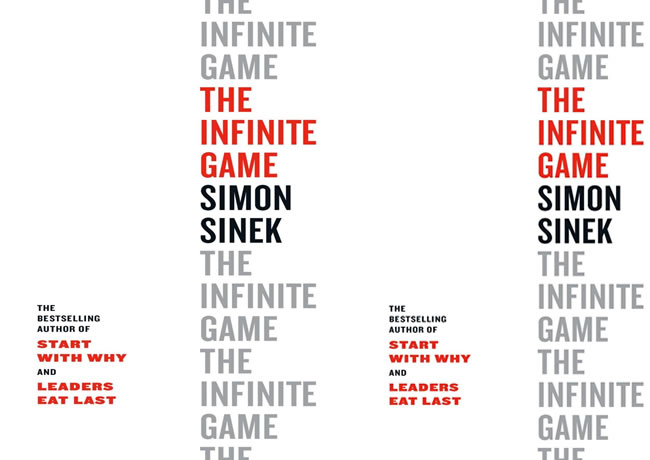The Infinite Game is Simon Sinek’s latest book. As usual with his works, the book centres itself around a basic idea, that is then analysed through several cases and anecdotes. The foundation concept derives from the book of James P. Carse Finite and Infinite Games: a Vision of Life as Play and Possibility, published in 1986.
Finite games are played by known players. They have fixed rules. And there is an agreed-upon objective that, when reached, ends the game. In Finite Games, a player plays to win. Infinite games, in contrast, are represented by known and unknown players. There are no exact or agreed-upon rules. In an Infinite Game, players play to keep playing. The objective is to perpetuate the game.
The problem is that we mostly see all games as finite, whereas some are purely infinite. And this is the case of organisations: most managers think of them as playing to win, by the rules of a finite game. But markets are much more similar to an infinite game.
Sinek identifies five essential practices for leaders that want to adopt an infinite mindset:
Advance a just cause
Build trusting teams
Study your worthy rivals
Prepare for existential flexibility
Demonstrate the courage to lead.
Sinek’s ability with words is known, and the book proceeds smoothly through examples and anecdotes looking at the various steps identified above.
The Just Cause is the core of the practices identified. It’s not the same as the WHY, as it is focused on the future, and should inspire us to want to keep playing. Sinek links this a lot with the concept of Servant Leadership and to that of service orientation, as both allow the organisation to be more infinite-minded.
The author analyses positively the current effort of many companies to define their purpose. However, he also notes that a Cause is not the same as a Goal or an Objective, and focused on the fact that profit is not a cause, but rather the fuel to advance a cause.
Talking about the Cause allows Sinek also to discuss a revision of the Responsibility of Business, a topic that has lately been very much discussed, reviewing the link between advancing a purpose, satisfying customers and generating profit.
Trusting teams is the second practice that Sinek identifies. Trust is a common thread in Sinek’s work, and in this case, the new reading lens he adds is that of what happens when trust is not nurtured. He talks of Ethical Fading identified as “a condition in a culture that allows people to act in unethical ways in order to advance their own interests, often at the expense of others, while falsely believing that they have not compromised their own moral principles.” Many examples are available, and mainly link the deconstruction of the culture of the company, where structure replaces leadership and culture disappears.
Chapter 9 introduces the concept of “Worthy Rival”, the idea that organisations should have a rival to which they compare themselves and get inspired on an attitude of improvement, but not with the purpose of “destroying” the adversary, but instead on the concept that in an infinite game both parties can succeed.
Existential Flexibility is the “capacity to initiate an extreme disruption to a business model or strategic course in order to more effectively advance a Just cause”.
Interestingly, in chapter 5, Sinek already defines Disruption as the “leaders’ failure to envision the future of their business as the world changes around them”, thus detaching it from pure technology. The Flexibility he introduces is really the capacity to develop the company in directions that go beyond its traditional business model, but are still aligned to the Cause.
All of the above practices are joined together by the courage to lead, i.e. the willingness to take risks for the good of an unknown future. Courageous leaders prioritise people before numbers and are strictly focused on delivering service.
YOU SHOULD NOT MISS THESE HEADLINES FROM NIGERIAN TRIBUNE
Cryptocurrency: Understanding The Craze, Threat
ON Friday, February 6, the Central Bank of Nigeria (CBN) rocked the boat with a circular that inadvertently highlighted how popular cryptocurrency transactions have become among Nigerians in recent years, judging by…
ICYMI: Yoruba, Hausa Teachers Needed In US
The US Embassy and Consulate in Nigeria has announced that the services of Yoruba and Hausa teachers are needed in the United States. According to the Public Affairs Section of the US Mission Nigeria…
Controversy Over Man Who Jumped From 7th Floor Of 1004 During EFCC Raid
The police in Lagos State have begun investigations into the circumstances surrounding the alleged death of a man at 1004 Estate, Victoria Island, who allegedly jumped from the 7th floor of one of the buildings. The man was…
INEC Lists Five Challenges Ahead Of 2023 Elections
AS politicians step up horse-trading ahead of subsequent elections, the Independent National Electoral Commission (INEC) has listed five main areas of likely challenges…
After Two Years, Daddy Freeze Apologises To Bishop Oyedepo
Daddy Freeze whose real name is Ifedayo Olarinde has apologised to Bishop Oyedepo who is the presiding bishop and founder of Living Faith Church aka Winners Chapel…
WATCH TOP VIDEOS FROM NIGERIAN TRIBUNE TV
- Let’s Talk About SELF-AWARENESS
- Is Your Confidence Mistaken for Pride? Let’s talk about it
- Is Etiquette About Perfection…Or Just Not Being Rude?
- Top Psychologist Reveal 3 Signs You’re Struggling With Imposter Syndrome
- Do You Pick Up Work-Related Calls at Midnight or Never? Let’s Talk About Boundaries







